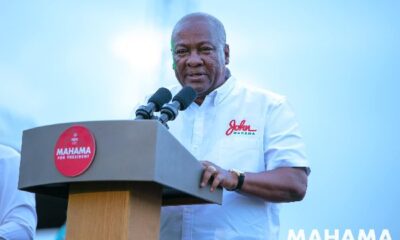Published
12 hours agoon
By
Diella Teku
In a bid to restore fiscal stability and drive development, Ghana’s President-elect, John Dramani Mahama, has unveiled a comprehensive strategy to overhaul governance structures, crack down on corruption, and curb public sector inefficiencies. Speaking in an interview with Germany’s DW TV monitored by adwoaadubianews.com, Mahama detailed his plans to implement sweeping reforms aimed at addressing Ghana’s pressing economic challenges, including rising national debt and the mismanagement of public resources.
Acknowledging public dissatisfaction with the current state of governance, Mahama described corruption and waste as critical roadblocks to progress. “The fight against corruption and waste needs to be taken to a new level,” he asserted, adding that bold measures will be necessary to rebuild public trust and create a resilient economy.
Central to Mahama’s agenda is the pursuit of constitutional reforms that align governance systems with Ghana’s contemporary needs. He emphasized the need for a “dynamic constitution” that strengthens accountability, streamlines public sector operations, and penalizes individuals who exploit their positions for personal gain.
“One of the first things we will do is revisit the constitutional review process and see how we can restructure things to build a governance system that minimizes waste and improves fiscal discipline,” Mahama explained. “This is crucial to ensuring our economic managers can handle public resources more effectively and avoid the kind of debt crisis we are currently facing.”
Mahama also underscored the role of strict enforcement in creating a culture of accountability within public institutions. He pledged to introduce severe penalties for corrupt practices, signaling a decisive shift toward transparency and governance reforms that prioritize efficient resource management.
These efforts, Mahama noted, would not only address the immediate challenges of debt and public sector inefficiencies but also lay the foundation for sustainable development and economic resilience in Ghana.


A New Dawn for Ghana’s Youth”: Mahama Pledges to Reset Ghana’s Future After Landslide Victory


Mahama Urges Transparent Transition Amid Allegations of Last-Minute Government Moves


President Xi Jinping Congratulates John Mahama, Reaffirms Strengthened China-Ghana Partnership


Mahama Vows to Cement Ghana’s Global Standing in Legacy Term


Official: John Mahama Declared as President Elect in Ghana’s 2024 Presidential Election


VIDEO: Mahama Spotted in NDC’s Election Strong Room: A Symbol of Leadership and Vigilance


Mahama Declares Victory After Bawumia’s Concession Call


Mahama Vows to Lead Ghana Out of Crisis, Pledges Legal Recognition for Islamic Marriages


Mahama Unveils Plan to Build Sports Stadia in All 16 Regions to Boost Youth Development and Regional Growth

























